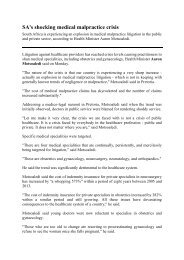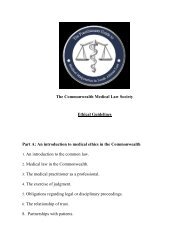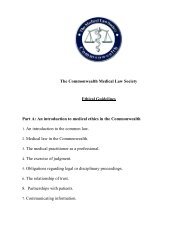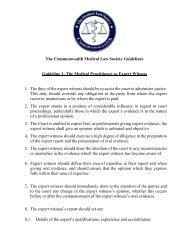WEEKLY BULLETIN: 20 FEBRUARY 2015
You also want an ePaper? Increase the reach of your titles
YUMPU automatically turns print PDFs into web optimized ePapers that Google loves.
<strong>WEEKLY</strong> <strong>BULLETIN</strong>: <strong>20</strong> <strong>FEBRUARY</strong> <strong>20</strong>15
A covenant of trust.<br />
“The goals of medicine as a profession dedicated to healing and caring of the sick in a<br />
dignified manner depend very much on a stable and trusting doctor-patient<br />
relationship…Adopting a patient centered philosophy in the doctor-patient relationship<br />
imposes the duty on doctors to do the utmost in caring for patients, and allows the sick to<br />
claim their right to humane and dignified care from doctors. As suggested in an editorial<br />
in Lancet a year ago, the terms “patient”, and not “customer” or “client” as some would<br />
advocate, best portrays this fiduciary nature of the relationship. Only by restoring the<br />
element of trust in this ageless patient-physician covenant, can the soul of the medical<br />
profession be restored and preserved regardless of technological and social changes in<br />
society”. The full article can be read at: http://www.uni-hildesheim.de/~beneke/WS03-<br />
04/Thesen04.pdf.<br />
10 Things You Want To Know About Medical Malpractice<br />
By Demetrius Cheeks<br />
Fact: According to the Journal of the American Medical Association (JAMA), medical<br />
negligence is the third leading cause of death in the U.S.—right behind heart disease and<br />
cancer.<br />
In <strong>20</strong>12, over $3 billion was spent in medical malpractice payouts, averaging one payout<br />
every 43 minutes.<br />
Alarming, right?<br />
But there are things that you can do to avoid becoming an unfortunate part of these<br />
statistics—to be your best health-care advocate. Jason Konvicka, a partner in the Virginiabased<br />
law firm of Allen, Allen, Allen & Allen, should know.<br />
Named as one of the state’s “Super Lawyers,” the seasoned trial attorney has won some of<br />
the largest personal-injury awards on record in the state, and recently secured the largest<br />
malpractice award in Virginia state court history.<br />
LearnVest sat down with Konvicka to discuss troubling trends in medicine and hear his<br />
advice on how people can lessen their risk of encountering medical malpractice.<br />
Jason Konvicka: Medical malpractice occurs when a health-care provider deviates from<br />
the recognized “standard of care” in the treatment of a patient. The “standard of care” is<br />
defined as what a reasonably prudent medical provider would or would not have done<br />
under the same or similar circumstances. In essence, it boils down to whether the provider<br />
was negligent.<br />
How do you determine if someone is the victim of medical negligence?<br />
A malpractice claim exists if a provider’s negligence causes injury or damages to a patient.<br />
However, experiencing a bad outcome isn’t always proof of medical negligence. Also, on<br />
occasion, health-care providers will inform a patient that the person has received negligent<br />
medical care from a previous health-care provider and—presumably in an effort at
complete honesty—will sometimes tell a patient that they, themselves, have made a<br />
mistake.<br />
Another motivating factor: A quick, honest “apology” might prevent a future claim, or<br />
provide an opportunity for a settlement without the need for litigation. Insurance<br />
companies typically want to settle with an injured person directly if they can, and this<br />
allows them to do so before the full extent of injuries are known, as well as preventing the<br />
injured person from hiring an attorney who could increase the settlement value of the claim<br />
through their representation.<br />
It’s vital to note, however, that the prosecution of medical malpractice cases—in addition<br />
to having a high likelihood of failure—can be extremely expensive, stressful and timeconsuming.<br />
It’s estimated that medical errors kill roughly <strong>20</strong>0,000 patients in the U.S. each<br />
year. Yet only 15% of the personal-injury lawsuits filed annually involve medicalmalpractice<br />
claims, and more than 80% of those lawsuits end with no payment whatsoever<br />
to the injured patient or their survivors.<br />
Consequently, most experienced medical malpractice attorneys will not pursue a case<br />
unless the injuries and damages documented in the records—after they’ve been reviewed<br />
by an expert in the pertinent specialty—are substantial and justify it.<br />
What should you do if you suspect that you’ve been subjected to negligent care? Is<br />
there a statute of limitations?<br />
Contacting a seasoned malpractice attorney should be the first step. A thorough review of<br />
the case details—this includes everything from securing pertinent medical records to<br />
interviews with the patient, family members and friends—should be conducted by the<br />
attorney to determine whether the case is actionable.<br />
Statutes of limitation—deadlines by which a lawsuit must be filed or be permanently<br />
barred—differ from state to state, as do the procedural requirements that must be met<br />
before a medical-malpractice lawsuit is filed. It’s always best to seek guidance from an<br />
attorney licensed in the state where the alleged malpractice occurred.<br />
What can patients do to lessen the likelihood that they’ll experience medical<br />
malpractice?<br />
Being proactive about medical care is undoubtedly the best step. Patients should do<br />
research to understand their health condition, and document their symptoms. They should<br />
ask health-care providers a written list of questions that they feel are important, and<br />
expect—indeed, demand—full and complete answers.<br />
It’s also critical not to allow yourself to be intimidated by the medical system. Speak up<br />
and advocate for your own well-being. If patients sense that something is wrong, they<br />
should tell—or ask—their health-care providers. Although it’s important to trust your<br />
doctor or nurse, it’s also important to listen to your body … and use common sense. Also<br />
advisable: Have a family member or friend accompany you on important visits to healthcare<br />
providers.
In your <strong>20</strong> years of practice, have you detected any shifts in the handling or<br />
perception of medical malpractice?<br />
Proponents of “tort” or “malpractice” reform often argue that there are too many medicalmalpractice<br />
claims. In reality, the number of claims is declining.<br />
Despite this, the perception of “lawsuits gone wild” exists. As a result, many states have<br />
imposed substantial limits on damage awards in medical-malpractice claims. These award<br />
limits typically have the greatest impact on patients who are most gravely hurt—those with<br />
catastrophic injuries and a lifetime of future medical needs. And patients who are denied<br />
justice in the courts must rely on health insurance and, in many instances, such public<br />
programs as Medicare or Medicaid to pay their future medical bills—leaving the cost of<br />
medical malpractice to the public instead of the responsible party.<br />
What are some of the most common reasons why legitimate medical-malpractice<br />
claims go unexplored?<br />
Patients choose not to pursue valid medical-malpractice claims for numerous reasons:<br />
Some are concerned that other doctors will learn of their cases and refuse to treat them.<br />
Some fear—incorrectly—that it will lead to an increase in the cost of their medical care.<br />
And others forgo valid claims due to the perceived personal and financial costs associated<br />
with litigation.<br />
Are there certain medical procedures that are consistently at the root of medicalmalpractice<br />
suits?<br />
In my experience, it’s the health-care provider’s mental state more than the type or severity<br />
of a given procedure that’s relevant to whether a mistake occurs. Complacency often leads<br />
to errors. Likewise, “tunnel vision,” or the failure to look at the big picture, can also lead<br />
to medical mistakes.<br />
What types of cases have been the most illuminating for you?<br />
Although the medical school adage of “treat the patient and not the test” has value, it’s also<br />
important for health-care providers to carefully assess the information provided by the tests<br />
that they order. I’ve witnessed many instances in which highly abnormal test results were<br />
either interpreted incorrectly or disregarded by physicians—sometimes with fatal<br />
consequences.<br />
Have your experiences as a malpractice attorney affected your perception of doctors?<br />
If anything, I have more respect for physicians and the challenges that they face. However,<br />
I don’t believe that doctors should be treated differently than others when they make<br />
mistakes that cause serious harm to patients.<br />
With regard to the medical establishment, I’m a bit more jaded. Hospital systems and<br />
health-insurance companies significantly impact the quality of medical care that patients<br />
receive, and, in my opinion, that impact is not always for the best.<br />
Any final parting words of advice?<br />
Don’t be afraid to get a second opinion! And don’t be afraid to find a new doctor if you<br />
don’t feel that you’re receiving proper medical care. Your health is too important to place<br />
in the hands of a provider who hasn’t earned your confidence, isn’t answering questions<br />
or isn’t giving you—or your condition—adequate time and attention.<br />
The above article was sourced at http://www.forbes.com/sites/learnvest/<strong>20</strong>13/05/16/10-<br />
things-you-want-to-know-about-medical-malpractice/2/.
Bid to cap medical malpractice payouts<br />
Durban - Health Minister Aaron Motsoaledi has put a radical plan on the table to limit<br />
payouts to victims of medical malpractice. Instead of lump sum payouts, for those who<br />
successfully sued the state, the minister wants them to be paid in instalments, which would<br />
cease on death, with no payments going to their families. And rather than cash payment<br />
for future medical expenses, a claimant would instead have to use public health facilities.<br />
The sweeping reforms, which would require changes to the law, have been proposed by<br />
Motsoaledi in an effort to put a cap on the spiralling medical negligence claims facing the<br />
state. During the <strong>20</strong>12/<strong>20</strong>13 financial year, the KZN Department of Health faced medical<br />
negligence claims totalling almost R1 billion (more than R992 million). This was R300<br />
million more than the previous financial year. There were 306 medical negligence claims<br />
in Gauteng, amounting to R1.286 billion while the Eastern Cape department faced lawsuits<br />
in excess of R875-million in the same financial year. Read the full article at<br />
http://www.iol.co.za/news/politics/bid-to-cap-medical-malpractice-payouts-<br />
1.1813364#.VOSPRmccRMw<br />
Medical negligence costs ‘threat’ to National Health<br />
Service<br />
A soaring bill from medical negligence damages has become a threat to the National<br />
Health Service, says one of the most senior business figures in Whitehall. He said there<br />
was a question as to whether patients should lose their right to sue. The NHS Litigation<br />
Authority, which provides indemnity cover for legal claims against the health service, has<br />
set aside £26.1bn to cover outstanding liabilities, equivalent to almost a quarter of the<br />
£113bn annual health budget: £1.6bn was paid out last year.<br />
The number of claims rose almost 18 per cent in the year from March <strong>20</strong>13. Jeremy Hunt,<br />
the health secretary, will on Wednesday announce financial sanctions for hospitals that<br />
fail to be honest about clinical mistakes, in a sign of growing concern about compensation<br />
costs. Read the full article at http://www.ft.com/cms/s/0/f4da10f6-a255-11e4-9630-<br />
00144feab7de.html#axzz3S6NNZtrG<br />
Delhi govt asked to pay Rs 8L for medical negligence at<br />
LNJP<br />
New Delhi: The apex consumer commission has asked the Delhi government to pay over<br />
Rs 8 lakh to the kin of a 46-year-old man who died due to "gross negligence" at the staterun<br />
LNJP hospital while being subjected to radiotherapy.A bench of National Consumer<br />
Disputes Redressal Commission (NCDRC), presided by Justice D K Jain, asked the Delhi<br />
government to pay Rs 8.25 lakh to the wife and three children of Ghaziabad resident<br />
Ramveer Singh, who died in October <strong>20</strong>04. Read the full article at<br />
http://zeenews.india.com/news/delhi/delhi-govt-asked-to-pay-rs-8l-for-medicalnegligence-at-lnjp_1538142.html
ICC CRICKET WORLD CUP<br />
SOUTH AFRICA V ZIMBABWE IN NUMBERS<br />
Here's a look at the few records broken during the third match of the ICC Cricket World<br />
Cup <strong>20</strong>15. It is only the second day of the ICC Cricket World Cup <strong>20</strong>15 but already the<br />
runs are raining down and the records continue to be broken.In Hamilton, fans at Seddon<br />
Oval were treated to big hitting from both South Africa and Zimbabwe, where a World<br />
Record was also smashed.Here are the numbers that mattered in Hamilton:<br />
256 – David Miller and JP Duminy’s fifth-wicket partnership was not only a World<br />
Record, it also completely changed the tone of the match. South Africa’s situation was<br />
starting to look dire at 84-4 before the pair took control, smashing their way to an<br />
unbeaten 256-run stand.It blitzed the previous record of 226* set by Eoin Morgan and<br />
Ravi Bopara against Ireland in <strong>20</strong>13.<br />
146 – The number of runs scored by Miller and Duminy off last ten overs, carrying South<br />
Africa from 193-4 to 339-4. A massive 96 of those runs came off the final five overs, a<br />
run rate of 19.2.<br />
138* and 115* - Miller and Duminy both scored tons, in only the third time both the<br />
No.5 and No.6 batsman scored 100s in the same innings.
HIGH-FLYING INDIA CRUISES TO VICTORY<br />
The Adelaide Oval, packed and vibrant as it savoured cricket’s most colourful rivalry, was<br />
a theatre of dreams on a memorable Sunday. India v Pakistan on any cricket field is<br />
guaranteed to be an unmissable event. When it is on a stage as grand as the ICC Cricket<br />
World Cup, in front of 41,587 passionate fans, it makes for the kind of spectacle that few<br />
other sporting showdowns can rival. India, the defending champion, came into Sunday’s<br />
(February 15) game short on form. It hadn’t won any competitive game in Australia for<br />
nearly three months, including a four-Test series and a tri-series that also included England.<br />
Pakistan carried momentum and ‘feel-good’ into this game, having put it past Bangladesh<br />
and then England, if only in the warm-up games. This was to have been Pakistan’s best<br />
chance to arrest a five-match losing streak to India in ICC Cricket World Cups. However,<br />
an energised Indian team ensured a sixth World Cup win over its neighbour. Mahendra<br />
Singh Dhoni roused themselves into a thrilling display. Virat Kohli’s 22nd One-day<br />
International century, which split entertaining half-centuries from Shikhar Dhawan and<br />
Suresh Raina, set up India’s impressive 300 for 7. The bowlers then stepped up, impressing<br />
with not just their intent but also their execution, they joined hands in a rip-roaring<br />
collective exhibition to bowl Pakistan out for 224. Victory on the night by a massive 76<br />
runs.<br />
BANGLADESH SPOILS WORLD CUP DEBUT FOR<br />
AFGHANISTAN<br />
When Bangladesh slumped to 119 for 4 in the 30th over, Afghanistan was in clover on its<br />
World Cup debut. But superb half-centuries from two former captains, Mushfiqur Rahim<br />
and Shakib Al Hasan, led Bangladesh to 267 all out, a total that proved far beyond the<br />
ambit of the new boys, who started disastrously with the bat and never recovered. Mashrafe<br />
Mortaza, the captain who had been one of the heroes of the victory over India at the <strong>20</strong>07<br />
World Cup, finished with 3 for <strong>20</strong> as Bangladesh started its campaign with a 105-run<br />
triumph in Canberra on Wednesday (February 18). See http://www.icccricket.com/cricket-world-cup/news/all-news

















